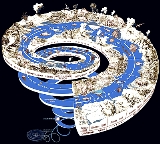
Paleontology
Overview
Paleontology (ˌpælɪɒnˈtɒlədʒi; British: palaeontology; from Greek: παλαιός (palaeos) "old, ancient", ὄν, ὀντ- (on, ont-) "being, creature", and λόγος (logos) "speech, thought") is the study of prehistoric
life
. It includes the study of fossils to determine organisms' evolution
and interactions with each other and their environments (their paleoecology
). As a "historical science" it attempts to explain causes rather than conduct experiments to observe effects.
Prehistory
Prehistory is the span of time before recorded history. Prehistory can refer to the period of human existence before the availability of those written records with which recorded history begins. More broadly, it refers to all the time preceding human existence and the invention of writing...
life
Life
Life is a characteristic that distinguishes objects that have signaling and self-sustaining processes from those that do not, either because such functions have ceased , or else because they lack such functions and are classified as inanimate...
. It includes the study of fossils to determine organisms' evolution
Evolution
Evolution is any change across successive generations in the heritable characteristics of biological populations. Evolutionary processes give rise to diversity at every level of biological organisation, including species, individual organisms and molecules such as DNA and proteins.Life on Earth...
and interactions with each other and their environments (their paleoecology
Paleoecology
Paleoecology uses data from fossils and subfossils to reconstruct the ecosystems of the past. It involves the study of fossil organisms and their associated remains, including their life cycle, living interactions, natural environment, and manner of death and burial to reconstruct the...
). As a "historical science" it attempts to explain causes rather than conduct experiments to observe effects.
Unanswered Questions

